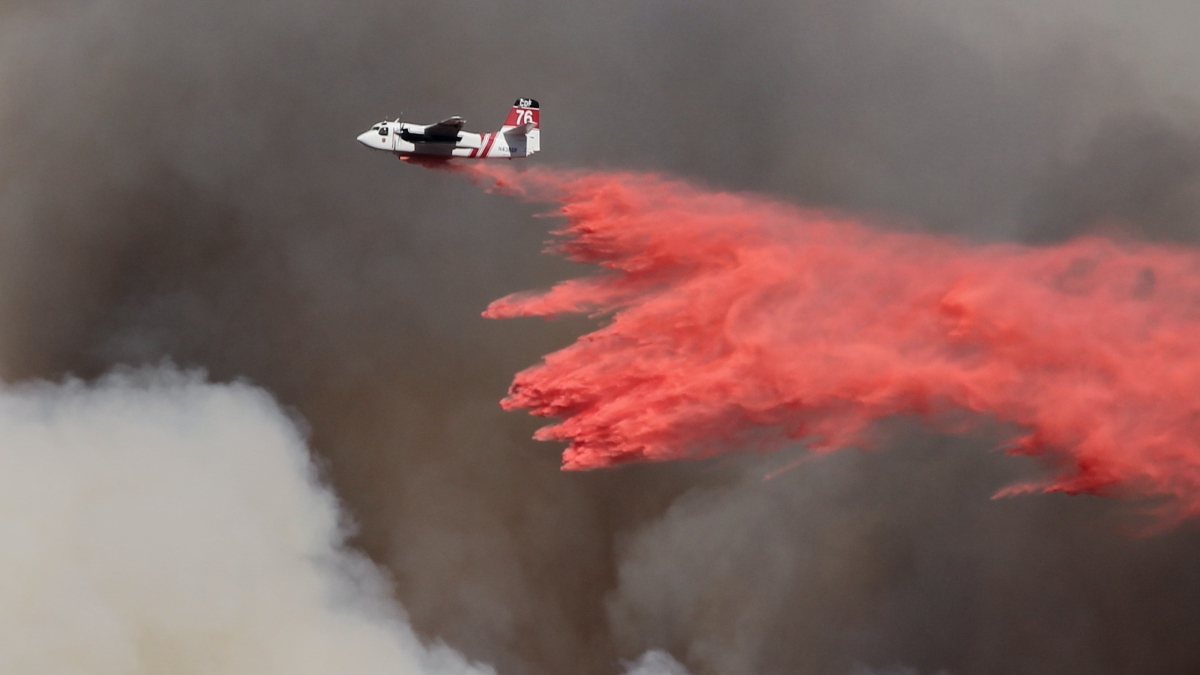Students may pursue new ASU bachelor’s degree in emergency management, homeland security starting this fall

An air tanker drops fire retardant on a recent wildfire near Thousand Oaks, California. Photo by Ben Kuo/Unsplash
The top-flight learning experience of Arizona State University’s graduate program in emergency management and homeland security (EMHS) — which U.S. News & World Report has ranked No. 1 in the nation for two consecutive years — will be offered to undergraduates starting this fall.
A concentration in EMHS for students pursuing a Bachelor of Science in public service and public policy has been available for many years, said Monica Gaughan, professor and interim undergraduate director in the School of Public Affairs.
But now students seeking careers in EMHS and wanting to take a deeper dive into a full major will be able to do so either online or in person, she said.
Many current students are military veterans with emergency services experience, Gaughan said. Others are already working as paramedics, firefighters, police officers and such careers where advancement could be slowed or halted by lack of a bachelor’s degree.
Students in the new Bachelor of Science program will gain knowledge in expanding areas of EMHS, including cybersecurity and biological threats.
“We tend to think of emergency management as involving natural disasters, but these are human-caused, and so the focus is also on homeland security,” Gaughan said.
Students in the new program, like those already in the graduate version, will learn how to look systemically at managing risk and crises, she said.
U.S. News & World Report announced its 2023–24 rankings earlier this week, listing ASU’s EMHS graduate program as No. 1 nationwide for the second straight year.
The full undergraduate degree program expands on the school’s already impressive EMHS offerings and builds on the expertise of the School of Public Affairs faculty, said school Director and Professor Shannon Portillo.
“U.S. News & World Report ranks the School of Public Affairs’ emergency management and homeland security specialty No. 1 in the nation, and now undergraduate students have the opportunity to pursue a full degree program in this area, or as a specialization in our public service and public policy program,” Portillo said. “We’re excited to launch the full EMHS undergraduate degree online and in person this fall.”
Associate Professor Brian Gerber, co-director of the ASU Center for Emergency Management and Homeland Security, said the new program is important for reasons even a casual observer of news and current events would understand.
“For one thing, we’re living in an increasingly complex world. There is also an increase in vulnerability in cyber- and biosecurity. The work of people who work in responding to and recovering from these hazards and threats is increasingly important,” Gerber said. “These are people entering public service, not just in government, but private-sector companies and nonprofit organizations as well. Students interested in a degree don’t necessarily have to work in government, because almost all organizations will be touched in some way by these disruptions and hazards.”
Students will see how such harms and threats are interconnected and will learn applied, practical skills to address such issues from multiple perspectives, Gerber said. A bachelor’s degree in EMHS is a start toward entering a very challenging professional environment, he said, and the program is designed to hone integrative and future-oriented thinking proficiencies.
“You have to think about these issues in a much broader way,” Gerber said. “If you want to reduce risk, what does that mean on a national or international scale? And how do you need to approach that? It’s more complex than learning to respond to a very specific disaster.”
Assistant Professor Melanie Gall, co-director of the EMHS center, said one important way ASU’s program is different from those of other universities is its emphasis on long-term sustainability thinking.
“Emergency management, when you think about it, is like an iceberg. What you see are the crises above the water, the hurricane, for example, but the rest is below the surface,” Gall said. “The training, the planning, the cross-sector work with the private sector and nonprofits, all these things are hidden from the public view, because when something bad happens, that’s when the cameras show up and you see the death and destruction. You want to have the crises be as little of your work as possible, because you want to avoid them.”
Gaughan said EMHS is one of many disciplines within the School of Public Affairs that focuses more on preventing problems than dealing with them after they occur, she said.
“With many things in government, you don’t know they’re going on, because things are going fine,” she said. “But that means there has been preparation for problems that have not emerged. You can’t prevent every problem, but you can be ready for them.”
Currently, about half of the undergraduate students enrolled in the public service and public policy baccalaureate program have opted for the EMHS concentration, Gaughan said.
Interested prospective students may visit the program website for more information about the undergraduate EMHS degree, or may write to Joe Kaufman at joe.kaufman@asu.edu.
The School of Public Affairs is part of the Watts College of Public Service and Community Solutions.
More University news

ASU graduates overjoyed — and employed
Adam Wiechman will soon be headed to the Big Apple. Grace Reiter will be pulling up roots in May and moving to Ann Arbor,…

ASU community exceeds goal, raises $835K for Valley of the Sun United Way
The Arizona State University community stepped up and raised over $835,266 for the Valley of the Sun United Way — exceeding the $…

ASU launches online ocean futures undergraduate degrees
Our oceans make up three quarters of the planet’s surface and contain most of its biodiversity. Due to rapid and global changes,…

